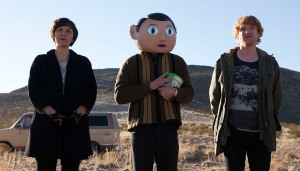BEING FRANK ABOUT ART AND FAME
The tortured artist is one of the world’s most common tropes and a common lens through which we tend to view the artistic world. It’s common to believe that the most wonderful art comes from the hearts and minds of those who have gone through unique and horrible traumas. True transcendent, genre transforming music, we muse, comes from someone like Rivers Cuomo; when he tired of the hollowness of fame and endless sexual trysts and wrote the classic Pinkerton album. Or it comes from the brush of Vincent van Gogh, a man struggling with depression, tortured by epilepsy, and changes in visual perception from the drugs given to combat his physical suffering. The movie Frank, directed by Lenny Abrahamson, plays with this somewhat glamorized view of art our culture holds through its two main protagonists. Jon, played by Domhnall Gleeson, embodies the beholden eye of this trope and it is Frank’s titular character, played by Michael Fassbender, that embodies the tortured artist persona.
Frank opens with Gleeson’s character, Jon, trying his very best to encourage his own music writing process. It is a painful opening three minutes that is to on the nose to the same inelegant process I tried to employ as a teenager trying to be like Paul McCartney and write about what I see. Gleeson howls and murmurs like a dreadful mashup of Penny Lane and a bag of cats against the wall. It firmly roots his character exactly where he is at, an aspiring artist who can play well enough, but has little to no lyrical or poetic talent. After returning to this spot ten minutes later in the film, he witnesses a man wrestling with police as they try to prevent him drowning himself. When he goes to investigate he finds that the man is a keyboard player in a band Jon saw would be playing at a local club that night. After conversing with Don (Scoot McNairy), a member of the band, Jon is drafted to play for them as the replacement keyboard player that night. At that gig, he is both initiated to the strange front man Frank, who dons a large, fake head, and the strange dynamics of the band as it ends in a shouting match and broken equipment.
Jon, sometime later, is contacted by Don to continue with the band on a trip to Ireland to stay at a vacation house. Unbeknownst to Jon, they are headed there to record an album and he ends up staying, after some convincing by Don and protestation from Clara (Maggie Gyllenhaal), to become their permanent keyboard player. As the movie progresses, Jon is exposed to Frank’s crazy and oftentimes confusing methods of expression and recording for the band. He eventually warms to Frank and sees him for the musical talent he is. Jon also tries desperately to achieve the same kind of artistic expression, called by the band, “their deepest corner”, to unsatisfactory results. He finds more of a release and following by documenting the band’s exploits and quirks as they record and his social media documentation leads them to landing a gig at SXSW.
After some unexpected turns, misfortunes, and hilarious conflicts, the band makes their trek to Austin, TX to play their gig and hopefully launch themselves into a more public awareness. It’s when they reach SXSW that the bonds of the band are tested by the prospect of fame and recognition and Frank and his bandmates are pushed to the brink by Jon’s push for the gig. The final third is what results when art meets fame and the current social media definition of fame.
What makes Frank such a good movie and one of my favorites of this year, so far, is the quirky nature of the humor, which fits the quirky, off-beat nature of the band, and Jon’s comical attempts to “manage” the band while recording and later once they arrive in Austin. Domhnall Gleeson’s performance as Jon is just the right blend of everyman naivety and wannabe music writer that we can connect with his character’s almost unquenchable desire to be something more than he is. Maggie Gyllenhaal is the perfect pessimistic foil to his optimistic ambitions and you really grow to dislike her until the very end when her abrasive demeanor is contextually revealed and we fully understand why she is the way she is. McNairy’s character gets a little lost as nothing more than a plot device after the first half, but he does a good job when he is on-screen.
The real commanding performance of the movie is rightly Fassbender as the plastic-headed Frank. Usually relying on his steely gaze and vocal presence (Magneto a prime example), he must rely on a different set of acting chops that does not disappoint. Fassbender maintains a commanding presence (of course, having a giant head will do that), genuine sincerity (*welcoming smile*), and touches of melancholy and madness that make his character both the dramatic and comic weight of the movie.
Jon’s journey along with Soronprfbs, the name of Frank’s band, is his discovery of his own misperceptions about artistic expression and the notion of fame. The process of this discovery comes from Jon’s push and pull relationship with Frank and his bandmates. From the moment he first meets the band on the previously mentioned shoreline of his hometown as they watch the police struggle with Jon’s soon to be predecessor on the keys, he notes that this band is both genius and mad. Their success, he believes, comes from their past struggles and slight mental instability; which he mutters about envying on two occasions. His vision of the tortured artist, and his quest to achieve those same ends, to reach his deepest corners, are broken down in several moments as the film progresses and this supposed handicap of a normal upbringing and stable life is not really the artistic handicap he makes it out to be. I won’t give away some of the major scenes, which are darkly funny as they are thought provoking, makes us re-think this notion that our artists have to die young and have tragic background in order to be successful.
On that same notion, Jon also is confronted with the reality of fame in a social media saturated world. The movie has this cool integration of social media into the narrative and helps us understand a little bit of how this unknown band recording weird, eclectic music ends up at SXSW. Jon records and posts the bands quirky and sometimes scary confrontations and recording sessions and it gains a small following (what they thought was much bigger) and buys them 15 minutes of internet and, unbeknownst to them, comedic fame. However, having gained all this notoriety, Jon needs help at a certain point in the movie and reaches out to their twitter following and fans. The internet comes out in its full glory and the response range from unhelpful, to sarcastic, to downright mean. When he goes to a local diner he is recognized and people yell about his fame, only for Jon to grow sick of the attention and plead for help, which the patrons only find more funny. It’s a humorous, yet very true, little commentary on how unknown you can be when you are well-known on the internet. Hopefully, there is not too much irony in posting links to this article on Facebook and Twitter, hoping people will know me and come back to read more.
Check out Frank on DVD, Blu-Ray, or for rent at Amazon
Jo sh Crabb is an editor at Reel World Theology, as well as sometimes contributor to the Reel World Theology podcast. You can connect with him on Facebook, Twitter, or on Letterboxd.
sh Crabb is an editor at Reel World Theology, as well as sometimes contributor to the Reel World Theology podcast. You can connect with him on Facebook, Twitter, or on Letterboxd.

